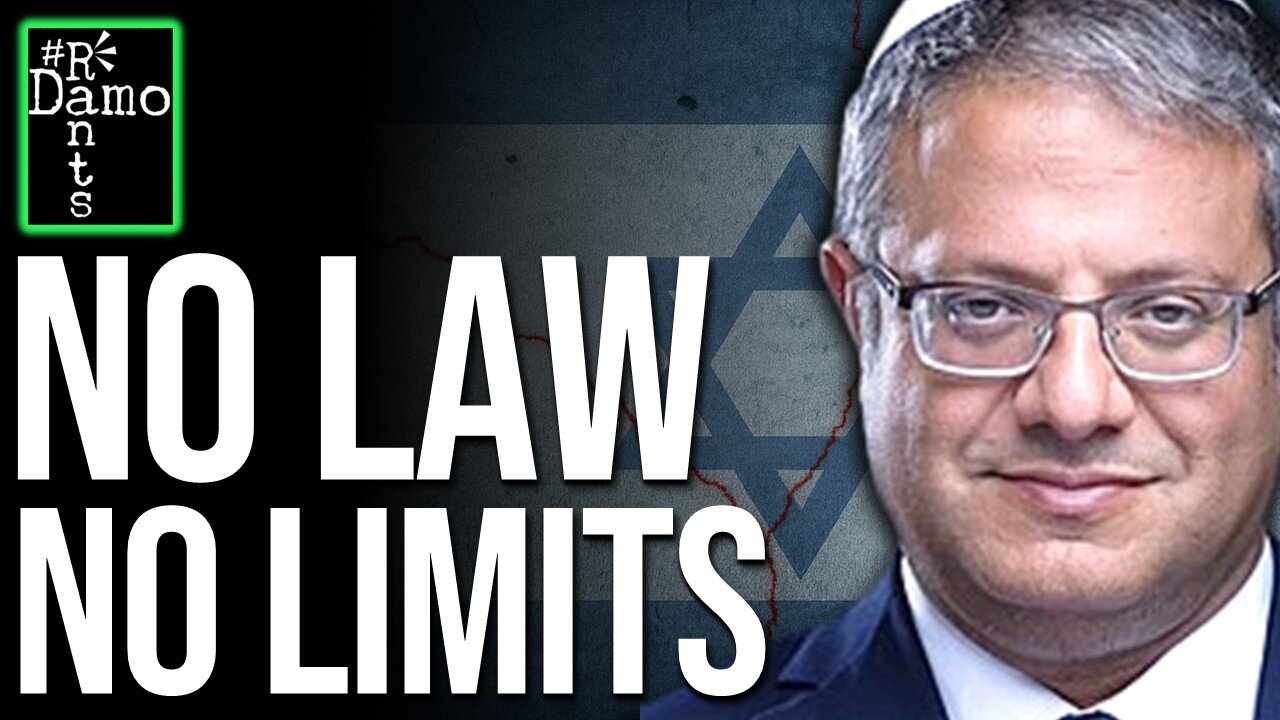Premium Only Content

Israel Voted to Execute Palestinian Captives — And Did it in Secret
Right, so it takes a special kind of government to hold an illegal vote during recess and then congratulate itself for its commitment to “law and order.” But that’s where Israel is now — a country where the far right breaks the law just to prove it still owns it. In an incident that has gone grossly underreported, while the Knesset was closed during recess, four MKs used that time time to quietly advanced a bill to advance the death penalty, execute Palestinians and then called it democracy. The only person who objected was thrown out for mentioning Israel’s own hostages and what this might mean for them. So much for that being the very reason for committing genocide in Gaza eh? The self-proclaimed “only democracy in the Middle East” just discovered that laws are easier to break when you’re the one who makes them — and the rest of the world, apparently too polite to notice, is still pretending nothing happened.
Right, so this incident took place about a week ago now, on 28 September, while the Israeli Knesset was officially in recess, but this is still an ongoing matter. Five members of its Israel’s National Security Committee, one of the most far right committees in Israel’s history, over half the representatives either belonging to Bezalel Smotrich’s Religious Zionism party, or Itamar Ben-Gvir’s Jewish Power gathered in a side room and did something they were not permitted to do. They held a vote. Four raised their hands in favour of a bill to impose the death penalty on Palestinians convicted of killing Israelis. One voted against. He shouted, “Shame on you, there are hostages,” and was as a consequence physically removed from the room.
That brief exchange tells the story of a state that has stopped treating legality as a boundary and started using it to do whatever the hell it likes. The Knesset’s own legal adviser had already issued a written warning that any vote during recess would be “null and void.” But it made no difference. The far right that dominates the committee, that has got Benjamin Netanyahu by the combover, held the vote anyway, recorded the result, and issued a press release celebrating it as progress.
The four votes in favour came from Tzvi Sukkot of Religious Zionism, Limor Son Har-Melech and Yitzhak Kroizer of Otzma Yehudit, and Boaz Bismuth of Likud. The absent member, Zvika Fogel, a retired general and close ally of National Security Minister Itamar Ben-Gvir, stayed away to allow a veneer of procedural distance. Gilad Kariv of The Democrats, the only member of the Committee not part of Netanyahu’s coalition, was the one who got thrown out. The optics of ‘democracy’ being thrown out of the room fits all too well.
The vote’s illegality was clear though. The House Committee had not authorised legislative work during recess; required consultations with the Justice Ministry and security agencies had not taken place. But the rulebook was never the point. This was a deliberate act of defiance, a demonstration that the far right now holds the levers of power and no longer feels obliged to pretend restraint.
The death penalty bill did not have to pass that day to succeed. Its purpose was to test the system’s limits — to see whether anyone would stop them. No one did.
The text the committee advanced is blunt. It mandates death for anyone convicted of killing an Israeli “out of hostility toward the State of Israel or the Jewish people.” Judges would have no discretion. The President would have no power to commute. There would be no appeal for mercy. It would be a mandatory sentence.
Israel, for as barbaric a state as it clearly is, has not executed anyone since Adolf Eichmann in 1962. The symbolic existence of the death penalty in statute has always served as figurative rather than literal — a clause that exists but is never used. This bill reverses that tradition.
Its wording ensures that the law applies almost exclusively to Palestinians. Israeli perpetrators who kill Palestinians, even in ideologically motivated attacks, would not be covered. The bill thus transforms collective vengeance into law and formalises a racist double standard that has long operated informally anyway.
Limor Son Har-Melech, a settler, who lost her husband in a 2003 ambush, introduced the bill as deterrence. But deterrence is the pretext, not the motive. For the far-right faction she represents, punishment is identity. The act of imposing death is meant to reaffirm control and sanctify Jewish victimhood as state policy.
Ben-Gvir has demanded this law for years. It was a condition of his 2022 coalition agreement with Benjamin Netanyahu: no death penalty, no government. The clause was written into the coalition contract alongside promises to expand settlements and weaken the judiciary. When the government was formed, the death penalty became not a policy discussion but an article of faith.
The Knesset’s legal adviser’s written assessment was clear: the committee lacked authority to vote, its session violated procedure, and its product had no standing. The chair, Tzvi Sukkot, convened it anyway. The press release followed within hours. What mattered was not legality but spectacle.
But to grasp the significance, you have to understand what the National Security Committee has become. Once an administrative body overseeing police and civil-defence coordination, it is now a vessel purely for Ben-Gvir’s ideology.
Sukkot is a settler activist from Yitzhar, known for his involvement in “price-tag” attacks against Palestinian villages. Son Har-Melech, the bill’s author, campaigns on “sanctifying Jewish blood.” Yitzhak Kroizer, another Otzma Yehudit member, is a Ben-Gvir loyalist who has called for “total war” in the West Bank. Bismuth, the former newspaper editor of Israel Hayom, provides the establishment gloss, representing Netanyahu’s party. Together they form a bloc united by the belief that the only real constraint on power is hesitation.
The committee has already passed measures to expand administrative detention and restrict prisoner rights. The death-penalty bill is not a deviation; it is the logical continuation of a two-year project to align Israel’s domestic security apparatus with far-right ideology.
This was not a misunderstanding of parliamentary procedure. It was an open challenge to it. The Prime Minister’s office quietly asked the committee to delay. National Security Minister Ben-Gvir told them to proceed. The chair obeyed Ben-Gvir. So who is really in charge?
The vote was also held over objections from hostage affairs coordinator Gal Hirsch, who warned that passing such a bill during negotiations could endanger Israelis held in Gaza.
That warning was ignored as well.
The act itself became a signal to Ben-Gvir’s base that the far right can overrule legal counsel, security experts, and the Prime Minister himself. In this worldview, illegality is no longer a crime; it is proof of authenticity. To break the rules in the name of the nation is the highest virtue.
When rule-breaking becomes the measure of conviction, democracy ceases to restrain extremism. It becomes the stage on which extremism performs its legitimacy.
This bill has to be acknowledged in terms of what is happening inside Israel’s prisons right now as well. Since Ben-Gvir took office, conditions for Palestinian detainees have deteriorated sharply. Food rations were cut, canteens closed, water access limited, and family visits banned.
After the events of October 2023 were escalated by Israel, detainee numbers tripled. Administrative detention — imprisonment without charge or trial — became the default tool. Entire wings of prisons were converted into isolation units.
By the middle of this year, Israeli human rights groups reported severe malnutrition, untreated disease, and physical abuse in facilities such as Ofer, Ketziot, and Damon. The Supreme Court’s July ruling confirmed that prisoners were being denied adequate food “for prolonged periods.” The court ordered the state to supply three meals a day — an instruction that should have been self-evident but had to be enforced by litigation.
At least 36 detainees have died in custody since October 2023, many showing signs of starvation or neglect. Families often receive bodies weeks later, if at all. The prison system has effectively become a slow-motion execution mechanism already.
The death-penalty bill therefore doesn’t introduce a new moral principle. It merely proposes to formalise what the system is already doing in practice, a system Ben-Gvir is in charge of.
Ben-Gvir and his allies justify these measures not in legal terms but in religious ones. They cite scripture about divine justice and vengeance. In their rhetoric, executing prisoners is not punishment but purification. The law becomes sacred when it eliminates impurity.
This fusion of faith and state power explains their disregard for procedure. Parliamentary rules, judicial oversight, and legal counsel are secular obstacles to divine mandate. Holding an illegal vote becomes a religious act — obedience to a higher order.
For a state that describes itself as democratic, this is an existential contradiction. The government’s far-right wing now treats democracy not as a system of rules but as a vessel for religious sovereignty. Law has become an instrument of theology. But for many Jews globally this is anathema to them, and of course when we see terror attacks on Jewish people and Jewish institutions, in no small part is this hijacking of theology one of the reasons for that. The Israeli far right endanger Jewish people globally, as they feign divinity.
Benjamin Netanyahu understands the danger, but he cannot control it. His survival depends on the same extremists who defy him. Without Ben-Gvir and Bezalel Smotrich, his coalition collapses, and his corruption trial resumes in full. They know this too.
His office asked for restraint; he received defiance. His ministers test his weakness daily, knowing that every capitulation deepens their hold. The death-penalty vote was not only a legal transgression; it was a power demonstration — proof that the Prime Minister no longer commands his own government.
The official response from his office was a single line about “security priorities.” The silence that followed spoke louder than condemnation ever could.
In most democracies, a parliamentary committee passing an illegal death-penalty bill would dominate the news. In Israel, it made the headlines for a day and disappeared.
Major outlets described it as “controversial” but not unconstitutional. International coverage was even more muted. Western governments issued no formal rebukes. The United Nations offered only a brief note that it was “aware of reports.”
This silence was not accidental either. Israel’s allies depend on the narrative that it remains a liberal democracy. Admitting that it has become a system where illegality is an instrument of power would shatter that myth. It would also raise uncomfortable questions about military and financial support.
Domestically, opposition leaders avoided confrontation. Yair Lapid called the timing “unwise.” Benny Gantz said nothing. Only Gilad Kariv spoke plainly — and he got thrown out. Even outrage is now regulated.
The normalisation of illegality through silence is the mechanism by which democracies decay. It happens not with coups, but with shrugs.
The meaning of this event lies not just in the vote but in what it represents. It shows that in Israel, illegality has become a governing method.
You can see the same logic in the conduct of the Gaza war. Back in August, Israel declared 600,000 people in Gaza City to be “potential targets” and cut off supply routes from the south. Collective punishment was repackaged as “security necessity.”
When a state treats the Geneva Conventions as optional abroad, it soon treats its own laws the same way at home. The illegal vote that took place was the domestic echo of the bombing campaigns in Gaza. In both, the principle is identical: might defines right.
Western governments that still call Israel a “partner in shared democratic values” are complicit in this erosion. Every dollar of aid and every statement of “ironclad support” reinforces a system where democracy survives only as a slogan.
The Knesset’s legal department can still declare the vote invalid. The Supreme Court could strike the bill down if it proceeds. But those formalities will not undo the damage. The far right has learned that the cost of illegality is negligible. Even if the bill is voided, the precedent stands.
Once an institution performs illegality without repercussion, it creates its own permission structure. Each repetition feels less extraordinary. The rule of law erodes not through repeal but through habituation.
This internal collapse of legality has international consequences as well. Negotiators in Doha or Cairo can no longer assume that Netanyahu can deliver on his word, not that he exactly has much of a track record on that anyway. If one branch of his government advances execution laws while another pleads for hostage safety, credibility evaporates.
Foreign mediators already know the real power lies with Ben-Gvir and Smotrich. They dictate the coalition’s boundaries and can collapse it at will. That makes diplomacy almost impossible. No ceasefire or exchange deal can hold when domestic politics reward defiance more than compromise. Look at where we are with Trump’s peace plan right now. Hamas accepted most of it, Netanyahu will torpedo it the minute Ben-Gvir or Smotrich demand it so.
Israel’s internal fracture has therefore become a regional security threat. Its inability to restrain its own extremists destabilises not only Gaza but the entire negotiation framework of the region.
The death-penalty vote reveals a state that no longer sees law as restraint. It sees law as a flag — something to wave while dismantling the meaning behind it.
The committee’s decision to ignore legal advice was not bureaucratic chaos; it was a statement of philosophy. Legitimacy now flows from ideology, not from process.
For years, Israel’s defenders insisted that its courts, civil service, and press would restrain its extremes. That argument no longer holds. The institutions remain in place, but their authority is ceremonial. They exist to absorb illegality, not to prevent it any more.
Outside Israel’s borders, the same mentality governs policy. Just in the last few days, tanks blocked the final road south out of Gaza City. Israel’s army warned residents this was their last chance to leave before intensified bombardment. Hundreds of thousands remained trapped.
The linkage between internal lawlessness and external siege is clear. The same government that ignores legality in parliament ignores it in war, not that this has ever been a just war, it’s a genocide. The same indifference to due process that justifies an illegal vote also justifies mass displacement. The difference is only one of scale.
“Shame on you, there are hostages.”
Those six words, shouted in a committee room and followed by physical removal, distilled the entire crisis. Kariv was not defending Hamas; he was defending Israel’s last trace of moral reasoning. His ejection showed what happens when empathy itself becomes unacceptable. Those hostages supposedly the reason Israel went into Gaza two years ago today.
The image is enduring: one legislator appealing to conscience while four colleagues vote for death. In that moment, legality ceased to be a language of governance and became a matter of muscle.
Every democracy tells itself that its institutions are self-correcting. But institutions only work when those in power believe in limits. When limits are redefined as obstacles, procedure becomes irrelevant.
The Knesset’s vote was one link in a larger chain. Each act of defiance without consequence reinforces the next. The result is a system governed not by law but by demonstration — a state that asserts control by proving it can break its own rules.
Law becomes optional; impunity becomes normal; outrage becomes performative. The process doesn’t announce itself as dictatorship. It arrives disguised as patriotism and wrapped in a flag. We know a thing or two about that here in the UK these days too.
This isn’t just another story from the Middle East. It’s a study in how democracies decay from within.
When illegality becomes routine and allies look away, the same logic spreads. Western governments that continue to fund or arm Israel while calling it democratic teach their own citizens that law is negotiable. Media systems that bury stories like this one teach audiences that outrage is futile.
If you believe democracy depends on accountability, this is your test case. What Israel’s far right has done in its own parliament is the endgame of every government that decides legality is a matter of convenience. The lesson is global.
The National Security Committee’s illegal vote may yet be overturned, but given the weakness of the system the far right now control and dictate to it might not be. Yet even if it is the damage is already done. The rule of law in Israel is now conditional, and everyone knows it.
This was the vote that shouldn’t have happened — held in recess, condemned by legal counsel, opposed by security advisers, and timed while hostages were still in enemy hands. The Knesset’s press office reported it as routine business. The country barely noticed.
Israel’s far right has discovered that the law can be broken publicly without consequence, so long as it is broken in the name of security. That discovery will not be unlearned.
The question now is not whether the bill passes its final readings. It is whether any line still exists that cannot be crossed. Because once a state learns that illegality itself can be governance, it never stops testing how far that lesson goes.
When a committee of parliament can break its own rules, ignore its legal adviser, defy its Prime Minister, and silence its only dissenting member, the word democracy no longer applies.
The death-penalty bill may never reach the statute book, but it has already achieved its purpose. It proved that in Israel today, illegality is power. The far right knows it. The Prime Minister knows it. And the world, mostly, prefers not to notice. Well some of us have.
What died in that committee room was not due process. It was the idea that Israel’s democracy could correct itself before it crossed a line it can’t return from.
For more on how the cracks in Netanyahu’s government are now growing over the proposed Trump peace plan and how Hamas accepting it has cornered him along with how the far right are smelling blood over this as well, check out this video recommendation here as your suggested next watch.
Please do also hit like, share and subscribe if you haven’t done so already so as to ensure you don’t miss out on all new daily content as well as spreading the word and helping to support the channel at the same time which is very much appreciated, holding power to account for ordinary working class people and I will hopefully catch you on the next vid. Cheers folks.
-

The Quartering
2 hours agoFat Acceptance Is So Over, Church Attendance Surges, Tim Pool Water, D&D Is Full Woke Trash!
81.2K11 -
 LIVE
LIVE
The White House
1 hour agoPresident Trump Makes an Announcement, Oct. 16, 2025
1,533 watching -
 LIVE
LIVE
Right Side Broadcasting Network
5 hours agoLIVE: President Trump Makes an Announcement - 10/16/25
6,338 watching -
 LIVE
LIVE
StoneMountain64
3 hours agoBattlefield 6 is just TOO FUN
157 watching -
 14:51
14:51
Dr. Nick Zyrowski
3 days agoWho Should Follow A Low Carb Diet? (Surprising Answer!)
5.95K2 -
 1:16:41
1:16:41
Steven Crowder
6 hours agoFacts Based "Racism" | Black & White on the Gray Issues Pt. 2
326K1.16K -
 1:02:50
1:02:50
DeVory Darkins
3 hours ago $23.00 earnedDemocrats HUMILIATED during painful town hall as Federal Judge drops desperate ruling
89.6K86 -
 1:16:49
1:16:49
Sean Unpaved
4 hours agoNFL Chaos, Jays' Homer Frenzy, & CFB/CBB Blue Bloods Overview
26.1K1 -
 1:02:23
1:02:23
Mark Kaye
3 hours ago🔴 MELTDOWN- Pelosi and AOC RAGE On Live TV!
20.8K7 -
 39:50
39:50
ArynneWexler
2 hours agoMarjorie's Meltdown and Mini Somalia in Minneapolis
11.9K11